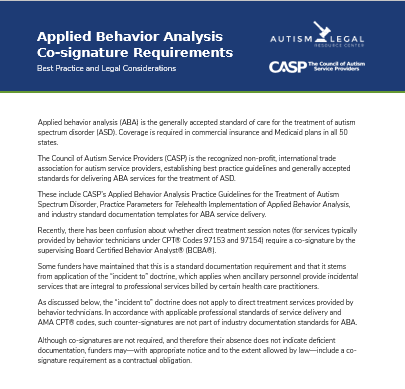Applied Behavior Analysis Co-signature Requirements
Best Practice and Legal Considerations
Background
In recent years, several Medicaid agencies, Medicaid Managed Care Organizations (MCOs), and commercial health insurance payers have introduced co-signature requirements for applied behavior analysis (ABA) session notes. These requirements are often outlined in payer ABA policies, specific documentation guidelines, or emerge as part of feedback during pre- or post-payment claims reviews and audits.
The co-signature requirement may vary. In some cases, it mandates that an authorized Qualified Healthcare Professional (QHP) co-sign all session notes for services rendered to any client on their caseload (e.g., for all 97153 or equivalent sessions). In other cases, the requirement stipulates that the parent or legal guardian co-sign all session notes for services provided on a given day (e.g., for all billable services related to the full adaptive behavior code set). CASP's session note templates do not currently include a section for co-signatures. Many ABA providers have expressed concerns regarding this omission.
This white paper, developed by the Autism Legal Resource Center and the Council of Autism Service Providers (CASP), explores legal considerations and best practices surrounding co-signature requirements.
Central to the discussion are topics such as the requirements for “incident to” services, whether these standards apply to ABA, contractual obligations, the Wellstone-Domenici Mental Health Parity and Addiction Equity Act (MHPAEA), and payer statements surrounding co-signatures to prevent fraud, waste, and abuse as well as enhance case management and direction activities.
Use
This guidance is intended to help ABA organizations advocate for the removal of co-signature requirements. Organizations focused on public policy and advocacy may use this white paper to push for policy changes that align documentation requirements with generally accepted standards and are consistent with the legal arguments outlined within.
Legal Disclaimer
This document should not be construed as legal advice. Organizations or individual providers should not stop complying with existing payer or regulatory requirements without obtaining written agreement from the relevant entity. ABA providers may wish to consult legal counsel to assist them through this process.



